It’s been a few weeks since our last update, as there isn’t anything too terribly exciting about rewriting existing protocols and features. Out of a touch of boredom yesterday, I have been playing around with some GUI ideas.

The front page shows the most recent five transactions, and gives brief details about the sending activity of the wallet. On the bottom, you have a few statistics about your wallet and the network, latency being the lowest-latency peer you are connected to. The bottom navigation tabs are straight-forward. The last tab (Explorer) can be toggled to an Address Book, an Accounts Page, a Transaction History, a Console Passthrough, or a Network Statistics page. The Console Passthrough will function similar to current -Qt Help->Debug Window.
The block explorer will allow for basic functions-look up the balance and history of an address, see the transactions of a specific block, and see what University was responsible for each block. We want the basic functionality of a block explorer built into the -Qt wallet to eliminate the need to rely on third parties to provide accurate and reliable information pertaining to account balances. However, fancy web-based block explorers will likely be created for the currency by third parties, and are encouraged.
Another modification to existing cryptocurrency structure-we are restructuring the address/private key storage.The new system will rely on an individual address model. Each address can be encrypted or decrypted at will. Forgetting the password for an address will render it unusable-and all coins that it contains will become inaccessible. No one can reset your password for you. Addresses can be publicly or privately named. If you have a popular donation address, you can purchase a public name for your address (called an alias) which can be used in lieu of your numerical address for transactions. Privately named addresses are names assigned to addresses in your own wallet, affecting only you. These make transaction histories easier to read. In the above screenshot, four out of five of the recent transactions occurred on addresses that are either in the address book (for outgoing transactions) or in your receiving book (for incoming transactions).